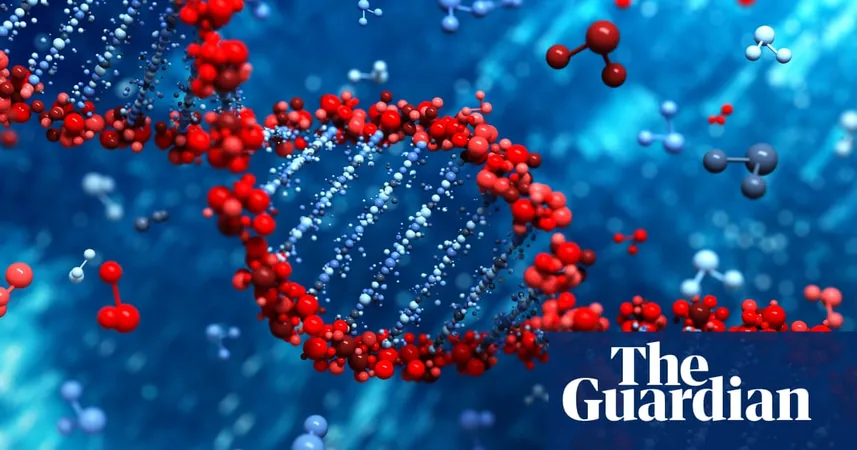
Scientists Sound Alarm: ‘Mirror Life’ Microbials Could Spell Disaster for Earth!
2024-12-12
Author: Emma
Introduction
Renowned scientists have issued a stark warning, calling for an immediate halt to research on “mirror life” microbes, as they pose what they describe as an “unprecedented risk” to all forms of life on our planet. The implications of this groundbreaking yet potentially catastrophic field of study have prompted an international coalition of experts, including multiple Nobel laureates, to urge a reevaluation of ongoing projects in synthetic biology.
Concerns Over Mirror Bacteria
These mirror bacteria, intricately crafted from the mirror images of naturally occurring molecules, could stealthily establish themselves in the environment. Prof. Vaughn Cooper, an evolutionary biologist at the University of Pittsburgh, expressed grave concerns regarding the challenge posed by these microbes to immune defenses of existing organisms. He stated, “The threat we’re talking about is unprecedented. Mirror bacteria would likely evade many human, animal, and plant immune system responses, leading to lethal infections that would spread unchecked.”
The Expert Coalition
The 38-member expert group, which includes significant figures like Dr. Craig Venter—who famously led the effort to sequence the human genome—implores scientists to cease work on this venture and for funding bodies to withdraw their support. They emphasize that even though developing a viable mirror microbe could take over a decade, the potential dangers are immediate and pressing.
Nature’s Dilemma
In nature, many biomolecules exist in two forms: one is right-handed (like the DNA found in all living organisms), while the other is left-handed (like the amino acids that make up proteins). This unique structure is perplexing; it raises questions why life chose this particular configuration when alternate options are theoretically possible.
Advancements in Mirror Molecules
As researchers have begun to manufacture large, functional mirror molecules to understand their properties better, some have made early, albeit tentative, steps towards creating these mirror microbes. Their motives include a fascination with mirror chemistry's potential—ranging from novel treatments for chronic diseases to enhancing the resilience of bioproduction facilities against contamination.
Published Risks and Concerns
However, a recent extensive report and commentary published in the journal **Science** has illuminated significant dangers associated with these microbes. Not only could they cause fatal infections, but experts also doubted the ability to contain or regulate them against natural predators and existing competition. Existing antibiotics may prove ineffective against such rogue organisms.
Shift in Perspective
Dr. Kate Adamala, a synthetic biologist at the University of Minnesota and a co-author of the report, highlighted a shift in her perspective upon evaluating the risks involved. “We should not be making mirror life,” she stated emphatically. “We have time for the conversation, and that’s what we were trying to facilitate with this paper—starting a global discussion about the implications of our work.”
The Call for Responsible Innovation
Adding to the discourse, Prof. Paul Freemont of Imperial College London commended the report as an “excellent example of responsible research and innovation.” While he underscored the necessity of a transparent dialogue on the development of mirrored organisms, he also recognized the promise that mirror chemistry holds and the positive applications it might yield, albeit within a strictly regulated framework.
Conclusion
As we stand at the intersection of synthetic biology and bioethics, this coalition of experts urges an urgent reassessment. Are we on the brink of creating something extraordinary, or have we ventured into peril that could have unforeseen consequences for life on Earth? The call for immediate discourse in the scientific community cannot be more pressing as the risks of ‘mirror life’ loom large.









 Brasil (PT)
Brasil (PT)
 Canada (EN)
Canada (EN)
 Chile (ES)
Chile (ES)
 España (ES)
España (ES)
 France (FR)
France (FR)
 Hong Kong (EN)
Hong Kong (EN)
 Italia (IT)
Italia (IT)
 日本 (JA)
日本 (JA)
 Magyarország (HU)
Magyarország (HU)
 Norge (NO)
Norge (NO)
 Polska (PL)
Polska (PL)
 Schweiz (DE)
Schweiz (DE)
 Singapore (EN)
Singapore (EN)
 Sverige (SV)
Sverige (SV)
 Suomi (FI)
Suomi (FI)
 Türkiye (TR)
Türkiye (TR)